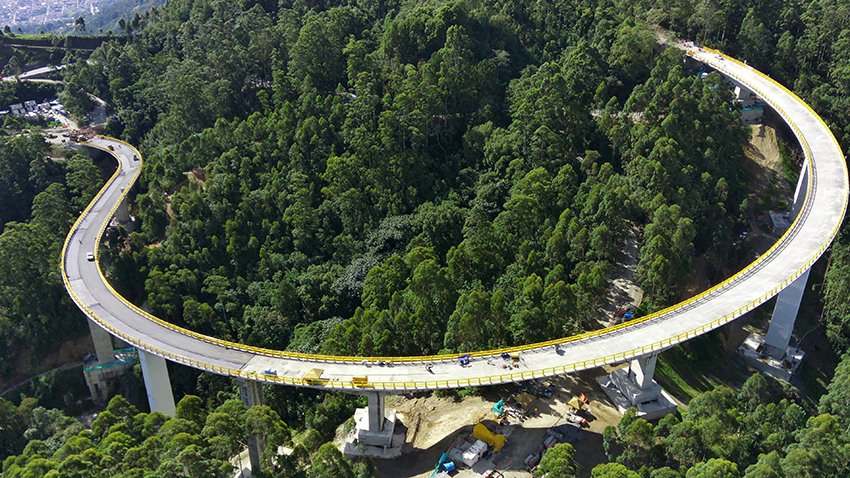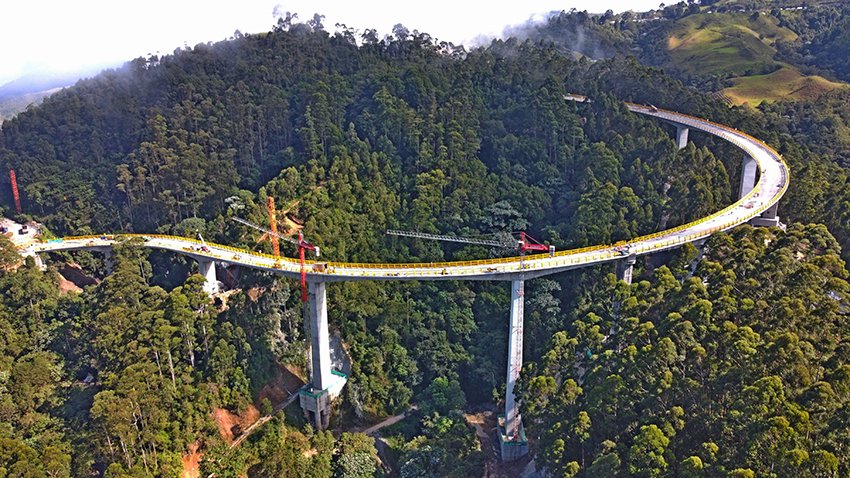This is the most important road project in the country’s history
Inauguration in Colombia of the Central Cordillera Crossing, a project in which OHLA has participated
OHLA has carried out the construction of the Quindío section to complete the Central Cordillera Crossing, the most important road infrastructure in the history of the country, with a global investment of 650 million euros (2.9 billion pesos).
The project as a whole consists of more than 31 viaducts, 25 tunnels and 3 road interchanges along 30 kilometers of dual carriageway between the municipalities of Cajamarca (department of Tolima) and Calarcá (department of Quindío). One of its most outstanding elements is La Línea tunnel, which, with a length of 8.6 km, is considered the longest road tunnel in Latin America. The main objective of this project is to improve the logistics of land transportation of passengers and cargo, since 40% of the country’s merchandise is transported along this road corridor and 18,000 cargo vehicles circulate each month.
Specifically, OHLA has carried out the construction of the Quindío section to complete the Cordillera Central-La Línea Crossing with the execution of five short tunnels, seven viaducts, a road interchange, a toll station and all the open-pit works in the 8 km that make up the corridor, including earthworks, retaining walls, slope stabilization, pavement and signaling.
Constructive challenges
During the project, OHLA’s technical team had to face several construction challenges such as the seismic isolation of the Yarumo Blanco, Macanas, Nogal Cafetero and Robles bridges, which have been developed in a high seismic hazard zone. There were also large differences in length (and stiffness) between the piers of each bridge. Specifically, on the Yarumo Blanco Bridge, a horseshoe-shaped structure and the longest of the 31 bridges that are part of the project (643 m), it was necessary to install 20 seismic isolators on 5 of the 10 piers of the structure using a pioneering technique of cuts at the base of the bridge.
From the point of view of road safety, OHLA has opted for the installation, for the first time in Colombia, of the PMH-38 vehicle restraint barrier on the Yarumo Blanco and Nogal Cafetero bridges. This guarantees the maximum level of containment required by the project, given its steep slope and the percentage of heavy vehicles that travel along the road corridor.
Colombia, a strategic market for OHLA
OHLA has been present in Colombia, one of its strategic markets, since 2008. In the country, it has developed important infrastructure projects such as the Quimbo Hydroelectric Power Plant, the Ayacucho Tramway, Medellín River Parks, the Metroplús Station and the Málaga-Los Curos Corridor. The company also undertook the Torre Ecocementos project and the Medellín Tramway. Its active projects include the Cúcuta Aqueduct, the Museum of Historical Memory, the construction for the adaptation to the Transmilenio system of the Troncal Avenida Ciudad de Cali, Section 1, and the Aerocafé project.

